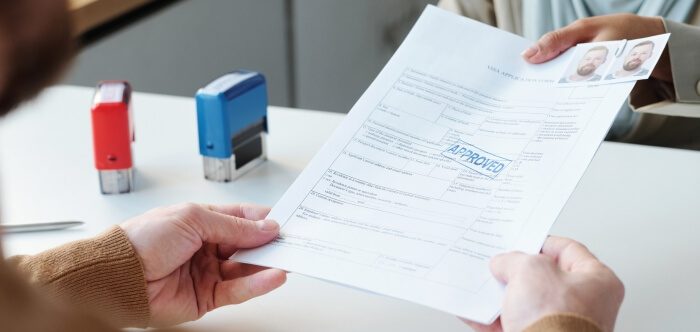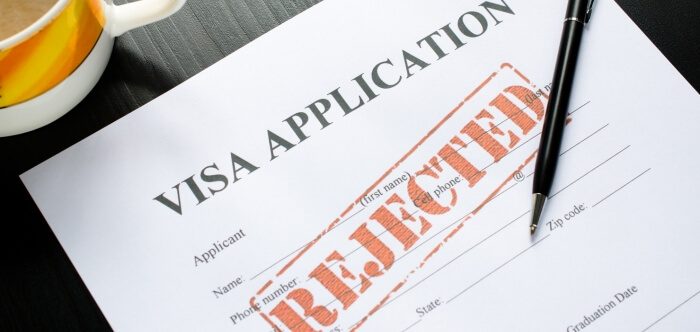Canada’s conference visa, a gateway for many professionals and academics to attend key events, often raises a crucial question: “Is Canada conference visa rejected due to family ties?”
Yes, it could. This intriguing point stems from the fact that having relatives in Canada could be perceived as a reason for applicants not wishing to return home post-visit.
This connection, while it seems to strengthen an applicant’s social ties within the country, can ironically act as a red flag for visa authorities. The concern hinges on the potential for overstaying, prompting a closer scrutiny of the applicant’s intentions.
To unravel this paradox and understand how you can manage your application successfully, keep reading. We’ll dive into the intricacies of family ties and their impact on Canada’s conference visa decisions, offering valuable insights and tips for a smoother visa application journey.
Canadian Visa Processing System: A Quick Summary
The Canadian visa processing system is designed to be comprehensive, ensuring that applicants meet all necessary requirements for entry. Whether you’re applying for a conference visa or any other type, the process generally follows a few key steps, making it manageable with the right preparation.
First, you need to determine which type of visa suits your purpose, such as a visitor visa for attending a Canada conference with invitation letter. After identifying the visa type, you’ll gather all required documents—such as a valid passport, proof of funds, and ties to your home country.
Once your documents are ready, you can submit the application online or at a Visa Application Center (VAC) in your country. After submission, you’ll be required to pay the visa fee and may be asked to provide biometric data (fingerprints and photographs). The processing time varies depending on your location and the type of visa you are applying for, but it’s essential to regularly check the status of your application online.
Throughout the process, immigration officials evaluate your application to ensure you meet Canada’s entry requirements. The decision will be communicated to you once the assessment is complete. If approved, you can attend your conference and explore Canada!
By following these steps methodically and keeping track of deadlines, the Canadian visa processing system can be navigated smoothly. Staying organized and proactive is key to a successful application.
Is Canada Conference Visa Rejected Due to Family Ties?
Yes, family ties in Canada can sometimes lead to the rejection of a conference visa application. If you’re wondering, “Is Canada Conference visa rejected due to family ties?”, the answer is that this aspect is considered when it raises concerns about the applicant’s intent to return to their home country.
Presence of Immediate Family in Canada
Having immediate family members in Canada can be a mixed factor when applying for a visa. On one hand, it shows strong connections to Canada, but on the other, it may raise concerns for visa officers about the possibility of overstaying.
Visa officers carefully evaluate this by considering your ties to your home country. If the ties to your home country appear weak compared to those in Canada, it could raise doubts about your intent to return. To strengthen your case, focus on providing evidence of your commitments back home, such as employment, property, or family obligations.
The key is demonstrating a balanced connection to both nations, reassuring officers that your visit to Canada is temporary and that you plan to return home afterward.
Duration and Purpose of Stay
When applying for a Canadian conference visa, the intended duration and purpose of your visit play a significant role in the decision process. Immigration officials want to ensure you have a clear plan and purpose for attending the conference.
It’s essential to outline your conference participation plans in detail, including event dates, travel arrangements, and any related activities. Being specific helps demonstrate your commitment to returning home after the conference and avoids raising any red flags about your intentions.
Ambiguity or inconsistency in your application could lead to delays or even rejection. By establishing a professional reason for your trip, you can build a strong case for approval, ensuring a smoother visa process.
Applicant’s Travel History
Your travel history can greatly impact your Canadian visa application. If you have a history of complying with visa rules in other countries, this works in your favor. It shows immigration officials that you are likely to follow the conditions of your Canadian visa as well.
On the other hand, if you have limited travel experience or have overstayed in previous countries, this could raise concerns. Immigration authorities may view this as a risk, questioning whether you will adhere to the visa terms in Canada.
Ultimately, travel history helps assess how likely you are to respect visa limitations. Having a clean, compliant record reassures officials, increasing your chances of a successful application.
Economic and Social Ties to Home Country
Economic and social ties to your home country play a crucial role in visa decisions. Immigration officials look for strong professional, familial, and financial ties as indicators that you plan to return home after your trip. This can include stable employment, owning property, or having close family connections.
If your ties to your home country are weak, it may raise concerns about your intent to return. For example, if you’re unemployed or have minimal financial stability, it could be viewed unfavorably during the visa review process.
To strengthen your application, it’s important to demonstrate a stable and rooted life in your home country. Providing evidence of ongoing commitments, like a job or family responsibilities, can greatly improve your chances of visa approval.
Financial Stability and Support
Financial stability is a crucial factor when applying for a visa, as it shows your ability to support yourself during your stay in Canada. Visa officers want to see that you have enough funds to cover accommodation, transportation, and other expenses while attending your conference.
Providing proof of steady income, savings, or sponsorship can help reassure immigration authorities that you don’t intend to seek employment in Canada. This could include bank statements, pay stubs, or a letter from your sponsor detailing their support.
If you fail to demonstrate adequate financial resources, it may raise concerns about your intent to return home. Visa officers may worry that a lack of funds could lead you to stay in Canada longer than planned or seek unauthorized employment.
Overall Application Credibility
The credibility of your visa application is a key factor in the approval process. Immigration officers will carefully review all the details you provide, so it’s important to ensure everything is accurate and consistent. For instance, inconsistencies or a past Canada conference visa rejection on passport could raise concerns.
Completeness is equally vital. Missing documents or leaving sections of the application incomplete can raise red flags. It’s always better to double-check everything before submission to avoid any issues later on.
By presenting a well-prepared, transparent application, you improve your chances of success. The more organized and thorough your application appears, the more confident immigration officials will be in your intent and qualifications to attend the conference.
Country-Specific Considerations
When applying for a Canadian visa, it’s important to remember that each country has its own specific considerations. These may stem from bilateral agreements or immigration trends between Canada and your home country. This means applicants from certain countries could experience more stringent scrutiny during the visa process.
For instance, you might be asked to provide additional documents or proof of ties to your home country, depending on the current immigration climate. It’s essential to understand these requirements and address them carefully in your application to improve your chances of approval.
By preparing your application to meet the specific expectations of your country, you can help ensure a smoother process. Researching beforehand and staying informed about the visa process in your region is key.
While family ties in Canada can influence a conference visa decision, it’s one of several factors. A holistic view of the applicant’s situation, intentions, and connections both in Canada and their home country is what ultimately determines the outcome.
Requirements for Canadian Visa Approval
Securing a Canadian visa involves meeting specific criteria that are carefully evaluated by immigration authorities. These requirements are designed to ensure applicants’ eligibility and intentions align with Canada’s regulations. A successful application hinges on satisfying these key requirements.
- Valid Passport: Applicants must have a valid passport with adequate remaining validity. It should have at least one blank page for visa stamping.
- Purpose of Visit: Clearly stating the visit’s purpose is essential. This includes providing details of plans and activities in Canada.
- Financial Means: Proof of sufficient funds to cover the stay is required. Bank statements or sponsorship letters can serve as evidence.
- Ties to Home Country: Demonstrating strong ties to the home country is crucial. This includes jobs, family, property, or ongoing education.
- Health and Character: A medical examination and police clearance might be needed. These assess the applicant’s health and criminal background.
- Travel History: A positive travel history can strengthen the application. Previous visa compliance in other countries is taken into account.
- Invitation Letter: For certain visa types, an invitation letter from a trustworthy conference organizer is necessary. This should detail the relationship and purpose of the visit.
A Canadian visa application requires careful preparation and attention to detail. Meeting these requirements enhances the chances of approval, facilitating a smooth entry into Canada for various purposes.
Why Does Canada Conference Visa Get Rejected?
Managing the intricacies of the Canadian conference visa process can be challenging. Applicants often face hurdles leading to rejection, despite seemingly strong applications. Understanding these common pitfalls is crucial for a successful application.
Insufficient Ties to Home Country
Applicants must demonstrate strong ties to their home country. Weak evidence of job, family, or property ties raises concerns about overstaying. Visa officers assess if applicants have compelling reasons to return post-conference. Inadequate ties often lead to doubts about the applicant’s intent.
Incomplete or Inconsistent Documentation
Precision in documentation is paramount. Incomplete or inconsistent information in the application can trigger rejection. One key to avoiding conference visa refusal in Canada is ensuring that all required documents are submitted accurately. Discrepancies between documents and the application details can be a red flag.
Lack of Financial Resources
Proof of sufficient financial resources is essential. Applicants unable to show they can support themselves during their stay face rejection. Bank statements and other financial documents are scrutinized. Insufficient funds or unclear financial support can jeopardize the application.
Doubts About the Conference Attendance
The genuine purpose for attending the conference must be clear. Vague or insufficient details about the event or participation can lead to skepticism. Visa officers look for specific information on the conference’s role and relevance. Ambiguity in this aspect can result in a negative decision.
Successfully obtaining a Canadian conference visa requires a well-prepared application addressing these common issues. Awareness and careful attention to these factors significantly enhance the likelihood of visa approval, paving the way for a smooth entry into Canada for conference participation.
What to Do if Your Canada Conference Visa Gets Rejected?
Receiving a Canadian conference visa rejection can be disheartening, but it’s not the end of the road. Understanding the appropriate steps to take following a rejection is crucial. It’s essential to approach the situation with a clear plan and determination.
Review the Rejection Letter Carefully
The first step is to review the rejection letter thoroughly. It often contains reasons for the visa denial. Understanding these reasons is critical for any future applications. This letter is valuable for identifying what went wrong in your application.
Address the Issues Identified
Once you understand the reasons for rejection, address them directly in a new application. Provide additional proof if the issue was sufficiently tied to your home country. For financial reasons, submit more comprehensive financial documents. Each point of rejection should be carefully and specifically countered.
Consider Getting Professional Advice
Seeking advice from immigration consultants or lawyers can be beneficial. They can provide insights and strategies based on their experience. These professionals can help identify weaknesses in your application. Their guidance can make a significant difference in your reapplication process.
Reapply with a Strengthened Application
After addressing the issues, reapply with a more robust application. Ensure all documents are complete and accurately reflect your situation. A well-prepared application addressing previous concerns increases the chances of approval. Patience and attention to detail are key in this step.
In summary, a Canadian conference visa rejection isn’t the final word. By carefully reviewing the reasons for refusal, addressing them, seeking professional advice, and reapplying with a strengthened application, your chances of approval can be significantly improved. It’s a process of learning and adapting to meet the stringent requirements of the Canadian visa process.
Tips to Avoid Rejection in Canada Conference Visa
Successfully applying for a Canadian conference visa involves meticulous preparation and attention to detail. Avoiding common pitfalls that lead to rejection is crucial. Implementing these tips can significantly enhance the likelihood of your visa approval. Here they are.
- Complete and Accurate Documentation: Ensure all required documents are complete and accurate. Any discrepancies can raise doubts about the authenticity of your application.
- Strong Ties to Home Country: Demonstrate strong ties to your home country through job, family, or property evidence. This shows your intent to return post-conference.
- Clear Purpose of Visit: Clearly articulate your purpose for attending the conference. Provide detailed information about the event and your role in it.
- Sufficient Financial Means: Make sure you have enough funds. Bank statements or a sponsorship letter can serve as proof.
- Travel History: If applicable, include your positive travel history. A record of complying with previous visa conditions can be beneficial.
- Health and Character Certificates: Provide health checks and police clearances if required. This proves you meet the health and character standards.
- Consultation with Experts: Consider consulting with visa experts or immigration lawyers. They can provide valuable insights and guidance for your application.
By ensuring thorough and accurate documentation, demonstrating solid ties to your home country, clarifying the purpose of your visit, proving financial stability, maintaining a positive travel history, providing necessary health and character certificates, and seeking expert advice, you can significantly reduce the chances of facing rejection in your Canada conference visa application. It’s all about presenting a well-rounded, credible application that aligns with Canada’s visa requirements.
Frequently Asked Questions
Can I still get a Canadian conference visa if I have family in Canada?
Yes, you can still get a Canadian conference visa if you have family in Canada. However, you’ll need to provide strong evidence of your intention to return to your home country, such as proof of employment, property, or other personal commitments that tie you back.
What documents can strengthen my case for a Canadian conference visa if I have family in Canada?
To strengthen your case for a Canadian conference visa, provide documents like proof of employment, property ownership, or business commitments in your home country. Showing return flight tickets and a solid conference invitation letter also demonstrates your intent to return after the event.
Do family ties in Canada increase the likelihood of a visa denial?
Yes, family ties in Canada can sometimes increase the likelihood of a visa denial. Immigration officials may be concerned about your intent to return home after the conference. However, providing strong evidence of your ties to your home country can help overcome these concerns.
Is a Canadian conference visa automatically rejected due to family ties?
No, a Canadian conference visa is not automatically rejected due to family ties. However, if immigration officials believe your family ties may affect your intent to return to your home country, it could influence the decision. Providing strong proof of return can help.
How can I prove my intention to return home despite family ties in Canada?
You can prove your intention to return home despite family ties in Canada by showing strong ties to your home country, such as a return flight ticket, stable employment, property ownership, or family commitments. These demonstrate that you plan to return after the conference.
Final Words
From our exploration’s critical insights, it becomes clear that the question “Is Canada conference visa rejected due to family ties?” holds significant weight in the application process.
While having family in Canada can influence the decision, it’s just one of many factors considered. A comprehensive approach, addressing aspects like solid ties to the home country, clear purpose of visit, financial stability, and accurate documentation, is vital for a successful application.
Moreover, understanding and rectifying the reasons for any initial rejection can pave the way for a successful reapplication. Ultimately, a well-rounded and meticulously prepared application acknowledging all these facets greatly enhances the likelihood of overcoming the challenges posed by family ties in the context of Canada’s conference visa.








